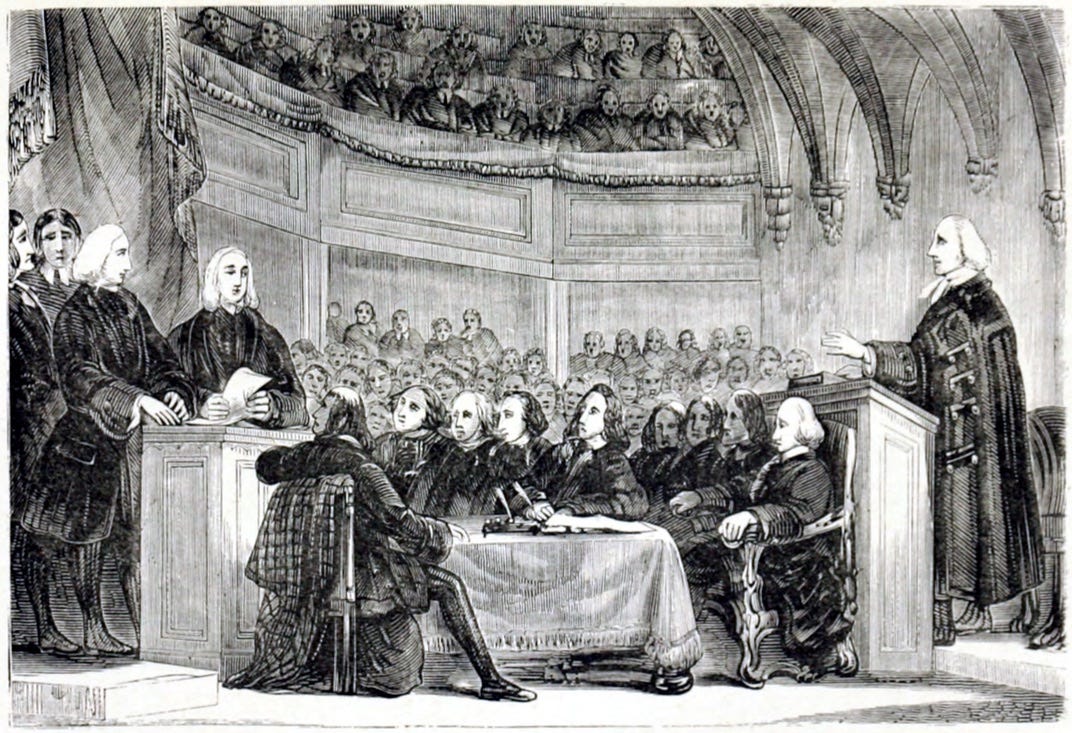Exploring Boston
Considering the forgotten life of a Marrow Man...
Introduction
“You've been given a great gift, George: A chance to see what the world would be like without you… Strange, isn't it? Each man's life touches so many other lives. When he isn't around he leaves an awful hole, doesn't he?”
This quote from It's a Wonderful Life speaks to a deep-seated fear we all share: that our ordinary lives might not matter. Yet, studying the ordinary lives of others often reveals the profound impact one person can have, giving us hope that our lives, too, can count for something greater.
I’ve endeavored to study a man who only lived for 57 years in a bygone era; a man who had such a full life and yet experienced much pain and loss; a man who was so controversial but has sadly been forgotten.
Can one man or woman’s life leave a permanent mark on this world?
The annals of Church history assure us it can.
Learning From History
As seen above, the secular world knows the importance of making our lives count and the impact one person can have upon so many. But for believers in Jesus, the Bible tells us to follow the Apostle’s example (1 Corinthians 11:1) and to follow the example of our local church leaders (Hebrews 13:7) simply because God can use their influence upon us to leave an indelible impression upon others for His glory.
And when it comes to church history, we’re not just seeing the impact of a man on his community or family, as wonderful as that is, we’re seeing Christ advance His Kingdom by His power. We’re seeing Christ’s promise to build His church progressively fulfilled through the development of doctrine.
Many Puritan writers and preachers have impacted me, and the Scottish Puritan, Thomas Boston, is no exception. Contrary to popular opinions, i.e, that a Puritan is someone with “the haunting fear that someone, somewhere, may be having a good time” (H.L. Mencken), Thomas Boston was the kind of Puritan who regularly sought to encounter Christ, rejoiced in gospel grace, and labored hard to advance the beauty of reformed theology in his day. I believe his life and theology (as it is faithful to scripture) matter for the clarity of the gospel which always matters for our lives and our churches.
Indeed, men and women from church history can impact us deeply. They are, in fact, our brothers and sisters; we can imitate their faith. We don’t dive into doctrine or study scripture in a vacuum—we do so with a great cloud of witnesses.
Beware of “chronological snobbery” (A term coined by C.S. Lewis)—the belief that we need not learn from the past because we live in a modern, advanced age.
We do well to heed the wisdom of Charles Spurgeon who said,
“It seems odd that those who talk so much about what the Holy Spirit reveals to themselves should think so little of what He has revealed to others.”
By no means are leaders from church history infallible or somehow more holy, but that does not mean that we can’t gain insight from them.
My Method
I have chosen to become a student of this man from the late 1600s but how will I tell his story?
Following Matthew Everhard’s formula for becoming a scholar of a historical figure, here’s what I plan to do:
1. Stick to only primary literature
Read:
The Memoirs of Thomas Boston
Boston’s major works: Man in His Fourfold State, Commentary on the Westminster Catechism, Union with Christ, Footnotes in Marrow of Modern Divinity, The Crook in the Lot, Repentance.
John Colquhoun (Pronounced: Ka-hoon) A Treatise on the Law and the Gospel.
After this…
2. Go to secondary literature
Read:
The Life and Times of Thomas Boston - Andrew Thomas
2,000 Years of Christ’s Power (Vol. 5) - Nick Needham.
The Marrow Controversy and the Seceder Tradition
The Whole Christ- Sinclair Ferguson (I’ll briefly revisit this outstanding book!)
The Federal Theology of Thomas Boston
Embracing & Offering Christ - John Biegel
Conclusion
Let's embark on this journey through time together; it will be worth your while.
History matters because people matter. The life and theology of Thomas Boston continue to speak and resonate today. My goal is to understand why and how his influence endures. By immersing myself in his life and writings, I aim to uncover the depth of his pastoral insights, particularly regarding the Law/Gospel distinction, the doctrine of union with Christ, and the relationship between faith and repentance.
As I delve into these aspects of Boston's work, I hope to share devotional insights that are relevant and relatable to our lives today. Through this exploration, we can draw valuable lessons that will enrich our lives.



